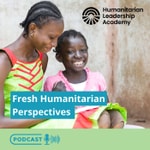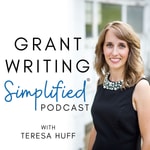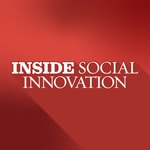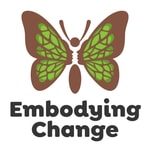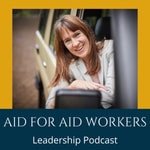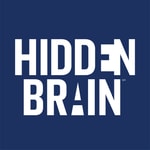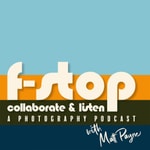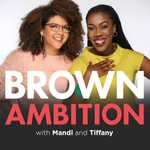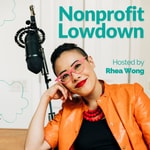NGO Soul + Strategy – Details, episodes & analysis
Podcast details
Technical and general information from the podcast's RSS feed.
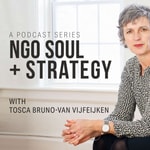
NGO Soul + Strategy
Tosca Bruno-van Vijfeijken
Frequency: 1 episode/22d. Total Eps: 93

Recent rankings
Latest chart positions across Apple Podcasts and Spotify rankings.
Apple Podcasts
🇨🇦 Canada - nonProfit
20/07/2025#88🇨🇦 Canada - nonProfit
15/07/2025#95🇨🇦 Canada - nonProfit
14/07/2025#82🇨🇦 Canada - nonProfit
13/07/2025#72🇨🇦 Canada - nonProfit
12/07/2025#63🇨🇦 Canada - nonProfit
11/07/2025#55🇨🇦 Canada - nonProfit
10/07/2025#43🇨🇦 Canada - nonProfit
09/07/2025#24🇨🇦 Canada - nonProfit
08/07/2025#19🇨🇦 Canada - nonProfit
07/07/2025#10
Spotify
No recent rankings available
Shared links between episodes and podcasts
Links found in episode descriptions and other podcasts that share them.
See all- https://www.charitynavigator.org/
75 shares
- https://5oaksconsulting.org/email/
70 shares
- https://www.springimpact.org/
46 shares
RSS feed quality and score
Technical evaluation of the podcast's RSS feed quality and structure.
See allScore global : 68%
Publication history
Monthly episode publishing history over the past years.
078. Which INGO Roles Are Still Legitimate, Relevant, and Needed (and Which No Longer): Dylan Mathews @ Peace Direct
Season 5 · Episode 78
mardi 10 septembre 2024 • Duration 49:46
Summary
How should INGOs discern what roles are still relevant, legitimate, and needed, at this moment in civil society history?
And which roles they therefore should *stop* playing?
Is there more here, over and beyond stopping service delivery? (Which on its own is quite the shift)
In this NGO Soul+Strategy podcast episode, I interview Dylan Mathews, Chief Executive Officer at Peace Direct. Peace Direct has been quite vocal, and has acted as a thought leader on this role question -- which I consider fundamental, and which I don't see INGOs facing head-on sufficiently yet.
Dylan's Bio:
- Chief Executive Officer of Peace Direct
- Director of International Programs at Y Care International
- Program Manager at CARE
- Worked on conflict countries and issues with Landmine Action, Oxford Research Group, and the British Red Cross
We discuss:
- While the sector is changing, once again, on several fronts (in terms of programming approaches, shifting authority/decision rights to the place of program impact representation, biz models, operating models etc.), what seems to get less attention is whether the organization should go through a fundamental role shift
- Common sense would say role and function, as well as strategy, should come before the other types of changes mentioned above
- One organization that is advocating that NGOs need to tackle the fundamental question of role shift is PeaceDirect, with Dylan Mathews as its leader.
- So what roles are still appropriate, especially for global North-founded INGOs?
- Dylan explains the nine roles that Peace Direct thinks are still appropriate for INGOs
- What are, importantly, the implications of a change in role and function for, for instance, board competencies and mindsets, organizational size, staff competency profiles, and culture?
- Dylan shares what gives him hope as INGOs traverse this journey, but also what makes him skeptical that the role shifts Peace Direct points to will actually take hold among INGOs,
Resources:
Peace Direct reading resources: Link1, Link2, Link3
YouTube video of this podcast
Click here to subscribe to be alerted when new podcast episodes come out or when Tosca produces other thought leadership pieces.
Or email Tosca at [email protected] if you want to talk about your social sector organization’s needs, challenges, and opportunities.
You can find Tosca’s content by following her on her social media channels:
077. Let’s Work Through This: Conflict Mediation in Social Sector Organizations With Nathalie Thompson
Season 5 · Episode 77
lundi 1 juillet 2024 • Duration 42:38
Summary
Conflict management and mediation are skills that come up frequently as a weak area in many of our social sector organizations.
And these days, more than ever conflict is on the rise within our organizations.
So how can we work through our conflicts more skillfully and effectively?
Nathalie has answers for us. She's a trainer conflict mediator (as well as a Corentus, Inc. team coach) who helps teams and organizations develop better conflict management capabilities.
And she's a valued colleague in a broader team I am a part of. Which means I get to learn from her!
In this NGO Soul+Strategy podcast episode, I interview Nathalie Thompson, Owner of 5 Fold Consulting, on conflict mediation.
Erica's Bio:
- Owner of ‘5 Fold Consulting’, a consulting and coaching firm focused on conflict management skill building and mediation
- Core Practitioner and Faculty at the Corentus team coaching company
- In short: mediator, facilitator, and coach
We discuss:
- It is often useful to work on task-related conflicts as a precursor to working on relationship-based conflicts.
- There are cross-national cultural differences in how humans deal with conflict. As a mediator, it is important to first build relationship, to inquire what makes for a good conversation for the person, and how to structure the conflict mediation process
- There are also gendered dimensions to conflict expression and management. Society tends to ascribe the term ‘aggressive’ to women (negative framing), for instance, when they engage in conflict, while men tend to be labeled as ‘assertive’ in the same context (positive or neutral framing)
- One way of minimizing interpersonal conflicts within organizations is to clarify expectations, styles, and preferences. Similarly, to clarify goals and parameters, and how to do the work.
- Also, to agree to tackle breakdowns in relationships by agreeing upfront how difficulties will be raised, and to work through the Corentus ‘6 question framework’ for dealing with breakdowns.
- Nathalie is among others an ombuds. This is an originally Swedish term that literally means: ‘representative of the people’, and is an independent, neutral person to whom staff in an organization can go for confidential advice, feedback on policy, procedure, or when they seek accommodation. Ombuds are independent from HR and can offer mediation, and raise sensitive issues such as harassment and performance issues with those in authority.
- The apparent rise in intra-organizational strife in civil society organisations is an extension of the external polarization in society: a tendency to think in terms of ‘one true way’ instead of accepting there are many different ways
Quotes:
“In the nonprofit sphere, people tend to be expected to be ‘so nice’; this makes it harder to exert accountability, and to say what needs to be said”
Resources:
YouTube video of this podcast
Click here to subscribe to be alerted when new podcast episodes come out or when Tosca produces other thought leadership pieces.
067. DEI trends in US development agencies, by the numbers – Shiro Gnanaselvam @ Social Impact
Season 5 · Episode 68
vendredi 12 janvier 2024 • Duration 01:02:09
Summary
What is the state of DEI in US-founded international development organisations (both for-profit and nonprofit), and how has this state changed since 2021?
What has been the action, as compared to the professed intentions for action?
In this NGO Soul+Strategy podcast episode, I interview Shiro Gnanaselvam, President and CEO at Social Impact, on DEI (Diversity, equity, and inclusion) trends in US Development agencies.
Shiro’s Bio:
- CEO of Social Impact, a US-based mid-size consulting company that offers MEL (Monitoring, Evaluation, and Learning) services to the international development sector
- Former EVP and COO of Social Impact
- COO of AfriCare, largest and oldest African-American founded international NGO focused exclusively on the continent of Africa.
- Senior Director, Monitoring and Evaluation, Millenium Challenge Corporation
We discuss:
- Racial and ethnic minorities remain under-represented in positions of power
- The global development sector remains predominantly white and female, including at the top
- Disability reporting shows signs of greater awareness
- Organizations have invested in establishing governance structures for DEI: policies, strategies and staff with dedicated responsibilities as well as collective staff bodies (DEI councils etc.)There are modest improvements in how diversity data are captured
- Commitment to DEI remains, but competing priorities and resource limitations are a severe impediment to progress
- There are tensions between global DEO, localization and domestic DEI that need to be resolved – but also many points of similarity
Resources:
Social Impact’s blog post on overall survey results
Social Impact blog post on 7 actions the US development sector must take
YouTube video of this podcast
Click here to subscribe to be alerted when new podcast episodes come out or when Tosca produces other thought leadership pieces.
Or email Tosca at [email protected] if you want to talk about your social sector organization’s needs, challenges, and opportunities.
You can find Tosca’s content by following her on her social media channels:
067. Life after leadership: Sam Worthington, former President and CEO @ InterAction
Season 4 · Episode 67
jeudi 7 décembre 2023 • Duration 49:52
Summary
What is life after leadership like?
What happens to you as a person when you leave a high-powered, highly visible role in civil society?
What happens with your sense of identity? Does this also perhaps touch on ego as well?
What offers new meaning and purpose, when we live our life-after-leadership?
In this NGO Soul+Strategy podcast episode, I interview Sam Worthington, former President and CEO at InterAction, who stepped down from a position with much positional as well as symbolic power just about a year ago.
Sam’s Bio:
- Executive coach, board member and advocate
- Former President and CEO of InterAction – 16 years
- Former President and CEO of Plan International USA
- Executive Director at Delphi International
We discuss:
- In the months before you leave your leadership job, expect that the extent to which your colleagues still want you to make decisions on important things will rapidly decline
- In Sam’s case, the sense of loss that was involved was not about loss of power (since he’d experienced positional power for a few decades), but was about loss of the comradery that former colleagues and peers used to provide
- You can partially fill this void by offering (informal) coaching to new incoming CEOs for instance.
- Life after leadership does mean you can move more from doing to being; you can be more present now
- Sometimes leaders, once they retire, still are called to speak in global gatherings based on their reputation, their personal brand
- Our knowledge which we can still contribute now is the synthesized wisdom of decades of experience
- Sam is writing a book to look back on everything he learned, his views on the sector, and what gives him hope -- follow him on LinkedIn to stay tuned!
Quotes:
- “The transition is about having been the village chief before; now, I am no longer in the village”
- “My public persona never was my identity”
Resources:
Book David Brooks, From Strength to Strength
Essay by David Brooks in The Atlantic: The New Old Age (gated)
YouTube video of this podcast
Click here to subscribe to be alerted when new podcast episodes come out or when Tosca produces other thought leadership pieces.
Or email Tosca at [email protected] if you want to talk about your social sector organization’s needs, challenges, and opportunities.
You can find Tosca’s content by following her on her social media channels:
066. How to navigate the big scaling quandary: Amy Ragsdale @ Spring Impact
Season 4 · Episode 66
dimanche 26 novembre 2023 • Duration 47:30
Summary
What is scaling? And how is it different from growing?
What’s the role of partner strategies or multiplier strategies in scaling?
What are the implications of scaling in an era of decolonizing aid, localizing development, and shifting roles of nonprofits and NGOs, shifting power, authority and decision rights?
In this NGO Soul+Strategy podcast episode, I interview Amy Ragsdale, Director at Spring Impact, a consulting, coaching and training agency specializing in scaling strategiesfor mission-focused organizations, on how to navigate the big scaling quandary.
Amy’s Bio:
- Director at Spring Impact
- Senior Consultant at Capgemini Consulting
- Research Fellow at the Max Planck Institute for Human Cognitive and Brain Sciences
We discuss:
- Spring Impact offers coaching, consulting services, and training for mission-focused organizations keen to scale their impact
- Growing the size of an organization or solution means increasing its revenue and/or impact at the same rate as adding resources to an organization. Scaling means you are impacting a societal problem at a larger scale, by increasing impact exponentially, while adding resources incrementally
- Central questions to ask: 1/ What are we scaling?; 2/ Where are we scaling?; 3/ Who will do the scaling? Who are the ‘doers’? Who are the ‘payers’?
- The following attributes of the organizational culture of social mission organizations act as enablers for scaling success: 1/openness to failure; 2/ an ability to hold our hypothesis on what works lightly; 3/ a realization that invention is not the same as innovation!
- The following leadership mindsets are enablers as well: 1/ clarity whether your org is pursuing growth or impact; 2/ staying committed to the problem (NOT the solution); 3/ being collaborative by default
- Financial sustainability models underpinning scaling strategies: examples can be government funding; earned income revenue; fee for service; advertising - and more
Quotes:
“Scaling is not the same as growing. The two are often confused. ”
“Invention is not the same as innovation! (the latter involves testing and learning)”
Resources:
YouTube video of this podcast
Click here to subscribe to be alerted when new podcast episodes come out or when Tosca produces other thought leadership pieces.
Or email Tosca at [email protected] if you want to talk about your social sector organization’s needs, challenges, and opportunities.
You can find Tosca’s content by following her on her social media channels:
065. How you should transition into a new role as a leader: Adama Coulibaly @ Oxfam
Season 4 · Episode 65
lundi 13 novembre 2023 • Duration 52:31
Summary
What are the vital steps a senior leader have to take as they step into a new leadership role? What to do and what to expect when you are transitioning into that new role?
And, separately, to what extent are African leadership models and frameworks different from global North ones? Most importantly, what could global North imprinted leadership models learn from African ones?
In this NGO Soul+Strategy podcast episode, I interview Adama Coulibaly, Global Programs Director at Oxfam, on both these topics. He is a very experienced NGO leader, a coach, and an eloquent thinker and author on all things leadership. And he just transitioned into his new role at Oxfam, so he is here to speak from experience!
Adama’s Bio:
- A seasoned leader with nearly 30 years of experience in international development and humanitarian aid
- Global Programs Director, Oxfam International; earlier in his career he was also a Regional Director at Oxfam
- Leadership positions as Country Director at the International Rescue Committee, Regional Director at Plan International, and Principal Adviser at UNICEF
- Certified Transformational coach, and somebody who labels himself a 'positive thinker'
We discuss:
- His advice to leaders who are transitioning into an organization, based on his own experience
- What differentiates African takes on leadership models and frameworks, as distinct from global North imprinted models?
- Adama Coulibaly (nickname ‘Coul’) considers himself a born positive thinker; he learned this behavior in his youth while facing very difficult circumstances in his home country Mali
- As an adult, he learned about the field of positive thinking; and that positive thinking is good for your physical and mental health
- Coul’s advice, in a nut shell, on how to transition into a new senior leadership position:
Give yourself at least 2, if not 4 weeks between two jobs
Use your break time to learn as much about your new organization as you can
Communicate healthy boundaries immediately, otherwise, you will pay a stiff price
Build on what works; don’t feel the need to change everything or most things
Prioritize external engagement, insist on it, and commit to external engagements so that your calendar time for this is protected
- On African models of leadership: they tend to focus on the collective nature of people: the person in the context of their community (see for instance the Ubuntu model)
Quotes:
- “Positive thinking is not about utopia: I call myself a realistic positive thinker. There are a lot of negative things in the world. It is about how we balance negative and positive things”
- “If you have a weak transitioning period, you set yourself up for failure”
- “As soon as you enter the door, you have to problem solve, there is no honeymoon for senior leaders”
Resources:
Positive minds, a pro bono consulting, coaching, and mentoring group (see also Coul’s blog on this site)
Coul’s blog post about leadership transition
YouTube video of this podcast&a
064. Positive power for organizational integrity: Bhavika Patel + Alex Cole-Hamilton
Season 4 · Episode 64
dimanche 29 octobre 2023 • Duration 48:57
Summary
What should we think of when we consider organization integrity issues?
How do you distinguish between positive and negative forms of power?
How do we nurture power for organizational integrity?
These are the fairly complex questions that we address in the podcast today.
In this NGO Soul+Strategy episode, I interview Bhavika Patel, Senior Adviser for Equalities and Inclusion at Oxfam Great Britain, and Alex Cole-Hamilton, independent consultant and one of the founders of the Power and Integrity Initiative, on their work on positive power for organizational integrity.
Bhavika’s Bio:
- Currently the Senior Adviser for Equalities and Inclusion at Oxfam
- Brings HR, culture, and EDI (equity, diversity, and inclusion) experience, with practical experience in understanding power in relation to EDI and organizational ways of working
- Led on HR issues in Oxfam, and has been a Talent Advisor at UNICEF
- MSC in applied positive coaching psychology
Alex’s Bio:
- Independent consultant, advising boards and executives on ethics and integrity risks and related decision-making frameworks
- Former head of Ethics and Compliance, Oxfam Great Britain
- Former head of Corporate Responsibility, Oxfam
- Former ethical trade project manager, The Body Shop
We discuss:
- The Power & Integrity Initiative is focused on UK-specific agencies; it aims to complement, but not overlap, with other ongoing activities, such as the RINGO project, Pledge4Change, #ShiftThePower etc.
- Concrete examples of measures and policy areas related to organizational integrity: safeguarding, anti-racism, Equity, Diversity and Inclusion (EDI), environmental sustainability practices, anti-corruption
- How is power perceived in general? And in our sector?
- How can integrity be understood more holistically, going beyond the classical interpretation of ethics, to look at people's behavior and organizational behavior in relationship to each other?
- The initiative just went through several Labs to pilot getting to a shared understanding of what power is (not easy!); their write-up on what was learned will be published in late 2023
- Positive power as a concept comes out of the thinking on transformative power, led by Srilatha Batliwala and others at CREA. It also builds on notions of power with, power within, power for and not just power over (hierarchical or positional or coercive power)
- Even if power is used with good intention by (in)formal leaders in our sector, whether we like it or not, the impact of white-normed organizational systems and processes is not neutral
Resources:
YouTube video of this podcast
Click here to subscribe to be alerted when new podcast episodes come out or when Tosca produces other thought leadership pieces.
You can find Tosca’s content by following her on her social media channels:
Twitter <
063. Decolonizing think tanks, policy research organizations and consulting agencies: Ajoy Datta
Season 4 · Episode 63
vendredi 6 octobre 2023 • Duration 58:31
Summary
How can the feelings of people who work in organizations both facilitate and suppress change?
What makes people attach reputation and credibility to another person? And how does this relate to diversity, equity, and inclusion efforts, and these may work out in practice?
What's the problem with think tanks from the perspective of a decolonization goal, and what has been the problem historically?
In this NGO Soul+Strategy podcast episode, I interview Ajoy Datta, consultant, policy researcher, and coach, on decolonizing think tanks, policy research organizations, and consulting agencies.
Ajoy’s Bio:
- Independent consultant
- Over 20 years of experience in the global development and humanitarian sector
- Supports leaders, teams, organizations, and networks to collaborate, perform better, learn, innovate, and change
- Performs designing, monitoring, and evaluating work to engage with and influence policy and practice as well as strengthen decision-making systems
- Worked 12 years at the Overseas Development Institute (DI)'s research and policy unit
- Worked 3 years at the On Think Tanks (OTT) consulting group
- Started at VSO, the British volunteer agency, in Zambia
We discuss:
- The useful role of psychodynamics in organizational development: what goes on in our minds, consciously and unconsciously, while working in organizations. Some of these feelings are suppressed and below the surface
- Decolonizing organizations means that we aim to do away with hundreds of years of Western, global North power, such as philosophical underpinnings, concepts, frameworks, assumptions, knowledge systems, and leadership profiles.
- When organizations recruit people who are dissimilar in demographic or experiential profile from those that were thus far considered the 'norm', the 'default' -- if their organizational culture, expectations towards staff, and org systems don’t adapt to these new profiles, tension will be the result. These people will be at higher risk of either leaving or being ‘spit out’
- The phenomenon of the glass cliff: when people with demographic profiles different from what was the norm thus far are recruited to high-risk leadership positions, and then fail.
- What to do about all of this? 1/ Name and acknowledge what is happening. If we fear talking about it, it will never be addressed; 2/ “decriminalize bias"; 3/ create a safe container for discussion; 4/ communicate externally but also internally
Resources:
YouTube video of this podcast
Click here to subscribe to be alerted when new podcast episodes come out or when Tosca produces other thought leadership pieces.
Or email Tosca at [email protected]
062. Nonprofit operations CAN be a driver of transformation: Kim Kucinskas @ Humentum
Season 4 · Episode 62
dimanche 24 septembre 2023 • Duration 50:56
Summary
How should we think about the ‘collective journey to equitable development’ of Northern-founded NGOs, national NGOs and their funders?
What obstacles stand in the way of continuing on that journey?
Why does Humentum argue that NGO operating models need to enable ERA (Equitable, Resilient, and Accountable) development, and how does that need to come about?
In this NGO Soul+Strategy podcast episode, I interview Kim Kucinskas, Director for Community Strategy at Humentum, on nonprofit operations as a driver of transformation.
Kim’s Bio:
- Director, Community Strategy, Humentum
- Director, Member Engagement and Services, Huentum
- Several other roles in Humentum since 2012
- Worked in Namibia on issues related to local epidemics
- Fundraising role at the International Institute for Cooperation and Development
We discuss:
- The pressure is building for significant change in the northern INGO sector; it’s coming from all frontiers
- There is actual strategic power in the operations model; if we change it in a significant way, big change happens in the power distribution between northern INGOs, funders, and national NGOs
- Humentum argues this in their new 3-part series of reports on ERA: how to move to an Equitable (E), Resilient (R) and Accountable (A) development sector
- But this will only happen if northern INGOs, funders, and national NGOs make significant changes in their institutional architecture, people and culture, funding, and risk frameworks
- Institutional Architecture is one of Humentum's main building blocks towards ERA: within this, organizations have to have sufficient autonomy for the sector to be able to be equitable, resilient, and accountable
- People and Culture: who is recruited, and works where; a shift in the ‘headquarters’ concept from one that is location-based to role-based; where staff receive fair and equitable compensation, etc.
- Funding: the islands of innovation that are happening in various places need to become ‘mainland’
- Accountability, with a focus on risk management: within this, a shift from risk transfer to risk sharing is required
- Be mindful: the way in which the process of #shiftthepower is happening is actually reflective of the very ways in which power is still being held right now.
Quotes:
“There is strategic value and potential in operations; not as “back-office functions” but as drivers of transformation”
“We are at a tipping point in terms of significant NGO sector change”
Resources:
Kim’s Email
Humentum's ERA reports
YouTube video of this podcast
Click here to subscribe to be alerted when new podcast episodes come out or when Tosca produces other thought leadership pieces.
Or email Tosca at [email protected] if you want to talk about your social sector organization’s needs, challenges, and opportunities.
You can find Tosca’s content by following her on her social media channels:
061. Between high profile civic disobedience and building broad public support: A youth activist
Season 4 · Episode 61
vendredi 21 juillet 2023 • Duration 36:53
Summary
How does a climate change activist movement such as Extinction Rebellion (XR) chose among strategies and tactics on the spectrum between more 'radical' actions such as civic agitation, (nonviolent) disobedience, high-profile stunts that may lead to arrests and more 'mainstream' actions that may (or may not?) help them build a more broad public base?
How does Extinction Rebellion (XR) see the distinction between insider and outsider strategies in climate change activism?
Is it necessarily the case that 'radical 'activism by nature is cyclical, i.e. that it cannot be maintained on a long-term basis because of the intensity of this activism model?
And how does Extinction Rebellion deal with internal as well as external equity dimensions of the fact that low-income people and/or those who face discrimination tend to get hit harder by the impacts of climate change?
In this NGO Soul+Strategy podcast episode, I interview a youth activist in the Netherlands (my original home country), on how she sees Extinction Rebellion tackle all these choices and trade-offs.
Bio of the youth activist X:
- Student at Erasmus University College, Rotterdam, the Netherlands
- Involved for the last year, 4-5 hours/week
We discuss:
- How climate change fights and climate justice issues need to be interlinked to both benefit from sustained civic action
- The nature of the three global XR demands: 1/ Tell the Truth; /2. Act Now; 3/ Decide together
- How environmental activism in the global south has a history of white elite-level advantage, how it rightfully has been critiqued for suffering from white elitism and how it is now trying to overcome this by focusing on embracing everybody’s contribution and being expressly inclusive
- Climate change requires both civil disobedience and broad public support. Collaboration between social movements such as Extinction Rebellion (XR) and formally registered NGOs is therefore important
- Groups like Greenpeace are better than XR at drawing in the media, examples such as the Netherlands NGO Milieu Defensie (Environmental Defense) are good in online petitioning, while movements like XR are good in mass mobilization. They need to complement each other
- The sustainability of engagement in XR-type activism, with its typical peak-type activities, fairly time-intensive forms of self-organization and democratic decision making styles may be challenged; XR expressly tries to compensate for this through encouraging collective self-care
Here you can find all the podcasts:
https://5oaksconsulting.org/podcast/
Click the link below to subscribe to be alerted when new podcast episodes come out or when Tosca produces other thought leadership pieces.
https://5oaksconsulting.org/email/
Or email Tosca [email protected] if you want to talk about your social sector organizational needs, challenges, and opportunities.
You can find Tosca's content by following her on her social media channels:
Twitter: www.twitter.com/Tosca5Oaks
LinkedIn: www.linkedin.com/in/toscabrunovanvijfeijken/
Facebook: https://www.facebook.com/Tosca5Oaks
Teachable: https://5oaks.teachable.com/
